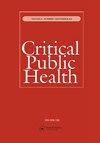进入问题的核心:与澳大利亚南部和中部土著妇女的研究伙伴关系
IF 2.3
3区 医学
Q2 PUBLIC, ENVIRONMENTAL & OCCUPATIONAL HEALTH
引用次数: 0
摘要
在绝大多数涉及土著人口的定性健康研究中,土著居民在研究的概念化和实施中被边缘化。这反映了缺乏对土著认识、存在和行动方式的尊重,使土著人民健康和福祉的叙述长期存在缺陷,并导致无法解决因持续的殖民化、制度化的压迫和种族主义而导致的不平等问题。有必要通过跨文化伙伴关系,将土著和西方知识结合起来,将土著的声音和行事方式置于研究的中心。本文探讨了如何应用这种方法,展示了一个概念化和行为的反思过程,该过程将澳大利亚土著社区与扎根理论的土著工作方式结合在一起。此外,它还支持一名非土著研究人员在社区协议的指导下学习尊重工作的方法。在土著妇女咨询小组的监督下,制定了一个分六个阶段的研究程序。研究概念和行为以三个原则为中心:将土著的工作方式与西方的研究方法结合起来;利用妇女自己的声音,发展心血管健康和福祉的叙述;并确保本着伙伴关系和互惠精神向妇女和社区提供切实成果。这种方法在所有步骤中都由土著妇女指导,展示了一种适应西方定性方法的方法,以确保价值观和道德行为准则的原则得到维护,以解开殖民主义的结构,纠正过去的错误,并扭转赤字叙述。本文章由计算机程序翻译,如有差异,请以英文原文为准。
Getting to the heart of the matter: a research partnership with Aboriginal women in South and Central Australia
ABSTRACT Within the vast majority of qualitative health research involving Indigenous populations, Indigenous people have been marginalised from research conceptualisation and conduct. This reflects a lack of regard for Indigenous ways of knowing, being, and doing, has served to perpetuate deficit narratives of Indigenous peoples’ health and wellbeing, and contributes to failure in addressing inequities as a result of ongoing colonisation and institutionalised oppression and racism. There is a need to place Indigenous voices and ways of doing at the centre of research by working in intercultural partnership, bringing together Indigenous and Western knowledges. This paper explores how such an approach can be applied, demonstrating a reflective process of conceptualisation and conduct that brings together Indigenous ways of working with grounded theory with Aboriginal communities in Australia. Furthermore, it supported a non-Indigenous researcher to learn ways of working respectfully, guided by community protocols. A six-stage research process was developed, overseen by an Aboriginal Women’s Advisory Group. Research conceptualisation and conduct centred on three principles: bringing together Aboriginal ways of working with Western research methodology; using women’s own voices to develop a narrative of cardiovascular health and wellbeing; and ensuring that tangible outcomes were delivered to women and communities in the spirit of partnership and reciprocity. This approach, guided at all steps by Indigenous women, demonstrates a way of adapting qualitative Western methodology to ensure values and principles of ethical guidelines of conduct are upheld to unravel constructs of colonisation, redress past wrongdoing, and reverse deficit narratives.
求助全文
通过发布文献求助,成功后即可免费获取论文全文。
去求助
来源期刊

Critical Public Health
Multiple-
CiteScore
5.90
自引率
7.10%
发文量
36
期刊介绍:
Critical Public Health (CPH) is a respected peer-review journal for researchers and practitioners working in public health, health promotion and related fields. It brings together international scholarship to provide critical analyses of theory and practice, reviews of literature and explorations of new ways of working. The journal publishes high quality work that is open and critical in perspective and which reports on current research and debates in the field. CPH encourages an interdisciplinary focus and features innovative analyses. It is committed to exploring and debating issues of equity and social justice; in particular, issues of sexism, racism and other forms of oppression.
 求助内容:
求助内容: 应助结果提醒方式:
应助结果提醒方式:


